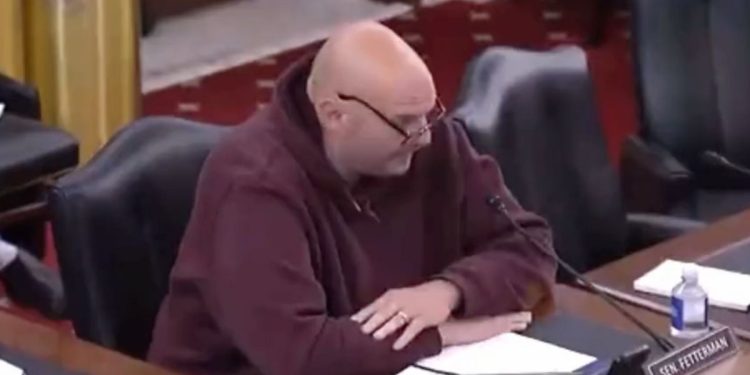It seemed a bizarre statement by Sen. John Fetterman as he objected to China buying up American farmland.
“I hope many of our colleagues agree — the Chinese government and other U.S. adversaries should own zero — zero — agricultural land in our country. I believe that,” the hoodie-clad senator said during a Wednesday hearing.
“I mean, they’re taking back our pandas! We should take back all of their farmland,” Fetterman said, seemingly referring to pandas from the Smithsonian National Zoo in Washington, D.C., being returned to China.
Fetterman actually makes a good point. Credit where it is due:
“The Chinese government should own ZERO agricultural land in our country. The are taking back our pandas, we should take back all of their farmland.” pic.twitter.com/vOjqpgfIK9
— Citizen Free Press (@CitizenFreePres) September 27, 2023
Fetterman is known for saying strange things. Yet the Democrat from Pennsylvania is onto something. And his brief statement — pandas and all — encapsulates the touchy relationship between the U.S. and the People’s Republic of China.
In the early 1970s, the administration of President Richard Nixon, believing such a populous country should not be estranged from America, began overtures to establish a relationship with China.
So began diplomatic activities that were little more than PR events — including U.S.-Chinese table tennis matches and China’s gifting of a pair of pandas to Washington — all culminating in a visit by Nixon to Beijing in February 1972.
Eventually, China went from being a country that could barely feed itself to one aggressively engaging in the market economy.
Such changes led U.S. government and business interests to believe that China’s emerging consumerism would also bring about political reform and personal freedom for Chinese citizens.
But communists are communists are communists. And China’s entrance into global market systems has been in the interests of China itself.
While one can point to the hollowing out of U.S. manufacturing and the theft of U.S. secrets, there has also been the ongoing purchase of U.S. farmland of which Fetterman spoke.
And Fetterman is alarmed — as all of us should be.
NPR recently reported that Chinese companies and investors owned about 384,000 acres of land in the U.S. as of 2021. That was just under a tenth of a percent of the 40 million acres of agricultural land owned by foreign entities.
Much of China’s land ownership is related to food production. Over a third of Chinese-owned U.S. land belongs to pork producer Smithfield Foods, according to NPR.
Chinese billionaire Sun Guangxin owns another 100,000 acres that he intended for a wind farm in Texas, but that plan failed due to the state wisely limiting foreign access to its electrical grid.
Chinese ownership of American land has prompted alarm among lawmakers besides Fetterman.
“I don’t know that we know for sure all the foreign land that potentially is owned by Chinese individuals or folks controlled by the Chinese government,” Democratic Sen. Jon Tester of Montana told NPR.
“Any company and any individual living in China that comes and tries to buy land can be controlled by the Chinese Communist Party because they have control over their people. … In this particular case — guilty until proven innocent.”
Also of concern have been Chinese land purchases near military installations, such as Grand Forks Air Force Base in North Dakota.
In August, Florida banned citizens of China, Venezuela, Syria, Iran, Russia and North Korea from buying land within 10 miles of military installations or other sensitive areas, according to The Associated Press.
Fetterman is right on the money on this. A communist is a communist is a communist.
Oh, and about those pandas.
In 2000, the Chinese, by then apparently past diplomacy and well into capitalism of sorts, wanted $10 million for a pair of pandas to stay in Washington for 10 years.
Following some contract renewals, Mei Xiang and Tian Tian are to return to China in December, according to WRC-TV, along with their 3-year-old male offspring, Xiao Qi Ji.
The Smithsonian says the return is related to research, not politics, and hopes to find replacements for the three departing animals.
So on that count — “they’re taking our pandas” — Fetterman may only be half-right.
But on the land purchases, his suspicions seem well-founded.
This article appeared originally on The Western Journal.


























 Continue with Google
Continue with Google